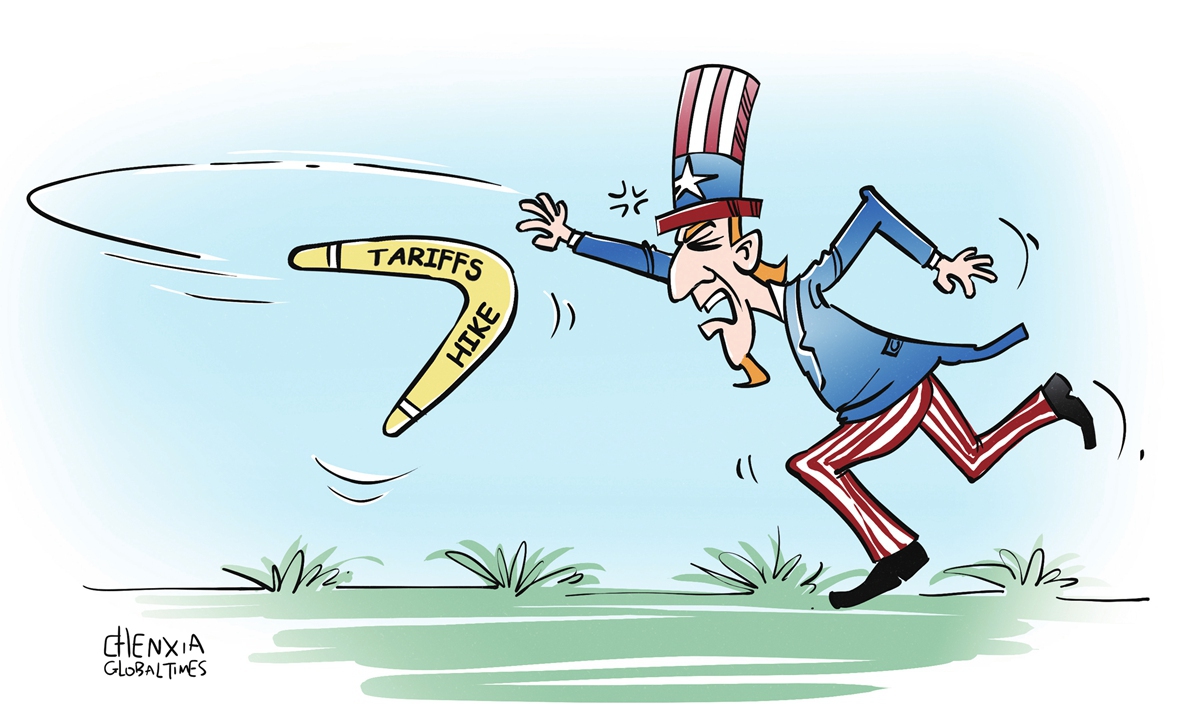
Illustration: Chen Xia/GT
The Joe Biden administration is expected to announce its final plan this week for implementing high tariffs on certain Chinese imports. The new tariffs were originally scheduled to take effect on August 1, but due to strong opposition and the need for "more time to coordinate industry opinions," the announcement has been postponed until the end of the month. We believe that the US, which claims to value democracy, should face widespread public opinion squarely and provide a responsible response to the voices of the people, rather than using "coordination" as a cover-up to continue harmful policies.
The new tariffs announced by the Biden administration in May of this year include crazy measures such as raising tariffs on Chinese electric vehicles to 100 percent, with the aim of "protecting US firms from China's overcapacity." However, the "protected parties" have now come forward.
These are not specific companies in a particular field, but "manufacturers from electric vehicles to electric utility equipment have asked for the higher tariff rates to be reduced, delayed or abandoned, and for potential exclusions to be greatly expanded." The strong and widespread opposition from the industry before these protectionist measures are even implemented foreshadows their eventual outcome.
The opposition comes from various industries and is highly persuasive. For example, regarding the proposed 25 percent tariff on port cranes, the Virginia Port Authority has pointed out that over 80 percent of the cranes in US ports are made in China. The US has no technology or intellectual property that needs protection, if new tariffs are imposed, US ports will either have to purchase cranes from China at higher costs or settle for cranes of lower quality. In addition, some lawmakers are urging the US Trade Representative's office to reconsider the planned 50 percent tariff on syringes, saying they could disrupt supplies for those used to feed newborn infants.
Even US companies that compete with Chinese firms have not benefited from the tariffs. Those submitting opinions this time include Ford Motor Co., because the artificial graphite to be levied on tariffs is a key material for electric vehicle batteries. Currently, Ford's use of synthetic graphite is almost entirely supplied by China. Autos Drive America, representing international car companies, also calls for maintaining stable tariffs on lithium batteries to support the production and popularization of electric vehicles in the US. It seems that Washington is trying to squeeze China's new energy industry chain through tariffs in order to compete for more market shares in the new energy industry. However, this approach will not work and will ultimately backfire. Meanwhile, the desire of American companies for China's new energy materials and components makes the "overcapacity" theory self-defeating.
The trade war that began during the Trump administration has failed, a fact that is largely undisputed both in and outside of the US.
The New York Times once published an article stating, "Trump's trade war didn't achieve any of its goals, but it did succeed in making America weak again." The current batch of tariffs being "coordinated" by the US makes it look like an ostrich burying its head in the sand. But a mistake is a mistake, and it will only prolong the disastrous outcome of the previous failure. A US scholar pointed out bluntly in an opinion column that by escalating the trade war, the administration is effectively admitting that these previous policies have not yet delivered, and "even if the tariffs are largely symbolic, they are a symbol of weakness."
Nowadays, these tariffs can no longer be called "economic measures," but they have become a political "sticky note" for the convenience of some politicians in Washington. It seems as though they believe they can appear brave and patriotic simply by implementing them. The real sacrifice is the genuine public and national interests of the US. Moody's has estimated that 92 percent of the costs of the tariff hikes will fall on US consumers, resulting in an average increase of $1,300 in annual household expenditure. The US Tax Foundation predicts that the new tariffs could cost the US 142,000 jobs. Drew Bernstein, co-founder of Marcum Asia, wrote on the Forbes website, "when they [tariffs] become a permanent, rigid part of the landscape, they ultimately accelerate a nation's decline."
In the current era of globalization, there is a high degree of interdependence between the economies of various countries, especially between the two largest economies in the world, China and the US. Any politicization or securitization of issues can easily lead to serious negative spillover effects, disrupting trade between China and the US and ultimately impacting global industrial innovation, supply chain stability, and economic development. The negative effects of Washington's wrong decisions on American industries and consumers began to form from the day they were implemented, disrupting global technological cooperation and trade order, and causing losses in the global supply chain.
It is widely noted that the timing of the US announcement of the final tariff plan was very close to the visit of US National Security Advisor Jake Sullivan to China. In a sense, Sullivan embarked on his visit to China amid the anti-tariff backlash.
Washington repeatedly emphasizes the need for "stable relations with China," and the opposition wave stirred up domestically in the US over tariffs clearly shows that the reason for the instability in US-China relations lies not in China, but in the US. Simply showing strength toward China does not make the US appear stronger. Instead, facing and correcting its own mistakes may make it appear more courageous.




